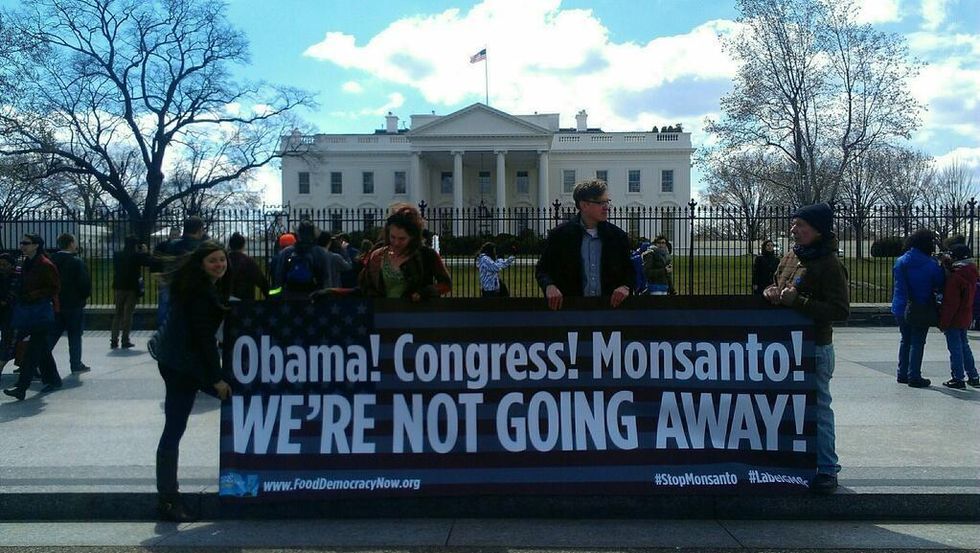A little-noticed rider in legislation, dubbed the Monsanto Protection Act by critics, signed into law by President Obama last Tuesday is sparking outrage as it begins to gather
wider media
attention and scrutiny.
Patty Lovera of the food safety advocacy organization Food and Water Watch writes that the rider
is a giveaway to genetically engineered seed companies that would allow the continued planting of genetically engineered crops even when a court finds they were approved illegally. This provision unnecessarily interferes with the judicial review process and picked up the well-deserved nickname of the "Monsanto Protection Act" because it weakens the already inadequate review process for GE crops. And it isn't a new idea - you may remember attempts last year to include this measure and two more that would have essentially created a fast track approval process for GE crops in the Farm Bill and in USDA's budget.
Thankfully, the rider in the continuing resolution doesn't include the other two provisions that create the fast track approval process. But it's still terrible news that the biotech industry can convince members of Congress who should know better, like Senator Mikulski (D-MD) who chairs the Senate Appropriations Committee, to include any bad language like this in a must pass bill.
Speaking on Al Jazeera's Inside Story Americas, Tom Philpott, food and agriculture writer at Mother Jones and co-founder of Maverick Farms, said, "What this is really about is ... ensuring that the USDA doesn't do rigorous environmental studies, impact studies of novel GMO crops. . . . Even if a judge rules that the USDA has improperly approved these crops, what this provision states is that the USDA has to permit their planting anyway."
"I think it's a pretty clear case of checks and balances of government being overturned," he said.
Speaking on the Senate floor, organic farmer and Senator Jon Tester (D-Mont.) argued against the rider, saying:
The United States Congress is telling the Agricultural Department that even if a court tells you that you've failed to follow the right process and tells you to start over, you must disregard the court's ruling and allow the crop to be planted anyway. Not only does this ignore the constitutional idea of separation of powers, but it also lets genetically modified crops take hold across this country, even when a judge finds it violates the law--once again, agribusiness multinational corporations putting farmers as serfs. It's a dangerous precedent. Mr. President, it will paralyze the USDA, putting the department in the middle of a battle between Congress and the courts.
The rider is "a clear violation of the separation of powers between three equal branches of government," stated Dave Murphy, founder and executive director of the grassroots group Food Democracy Now!, which gathered over 250,000 signatures to tell Obama to veto the "Monsanto Protection Act."
"Not only does the Monsanto Protection Act undermine the sovereignty of U.S. courts," Murphy said in a statement, "but it also makes it impossible for government officials to faithfully protect the American public from potential human health and environmental harms of untested genetically engineered crops."
The rider has even roused the ire of the Tea Party Patriots.
So how did it get into the spending bill?
Foodopoly author and Food and Water Watch executive director Wenonah Hauter says just follow the money.
Speaking on Democracy Now! Tuesday, Hauter said:
I think we have to look at how much money that the biotech industry has spent on lobbying. I mean, over the last 10 years, the biotech industry has spent $272 million on lobbying and campaign contributions. They have a hundred lobby shops in Washington. They've hired 13 former members of Congress. They've hired 300 former staffers for the White House and for Congress. And Monsanto alone has spent $63 million over the last 12 years on lobbying and campaign contributions. This is about political muscle and forcing their will on the American people. And if we don't put a stop to it here, we're going to see many, many more serious violations.
Eric Darier, a senior campaigner on sustainable agriculture at Greenpeace International, adds:
This should also be a reminder to all of us across the world of the ability of some corporations like Monsanto to influence policymakers to adopt measures that are against sustainable agriculture, farmers, consumers and the environment. And let's now add to this list: independent judicial review! A very sad day for democracy and the future of our food.
The legislation may already have Obama's signature, but Food Democracy Now! is continuing its fight against the effects of the "Monsanto Protection Act."
The group is now calling on Obama to issue an executive order to require the mandatory labeling of genetically engineered foods.
* * *
___________________________

